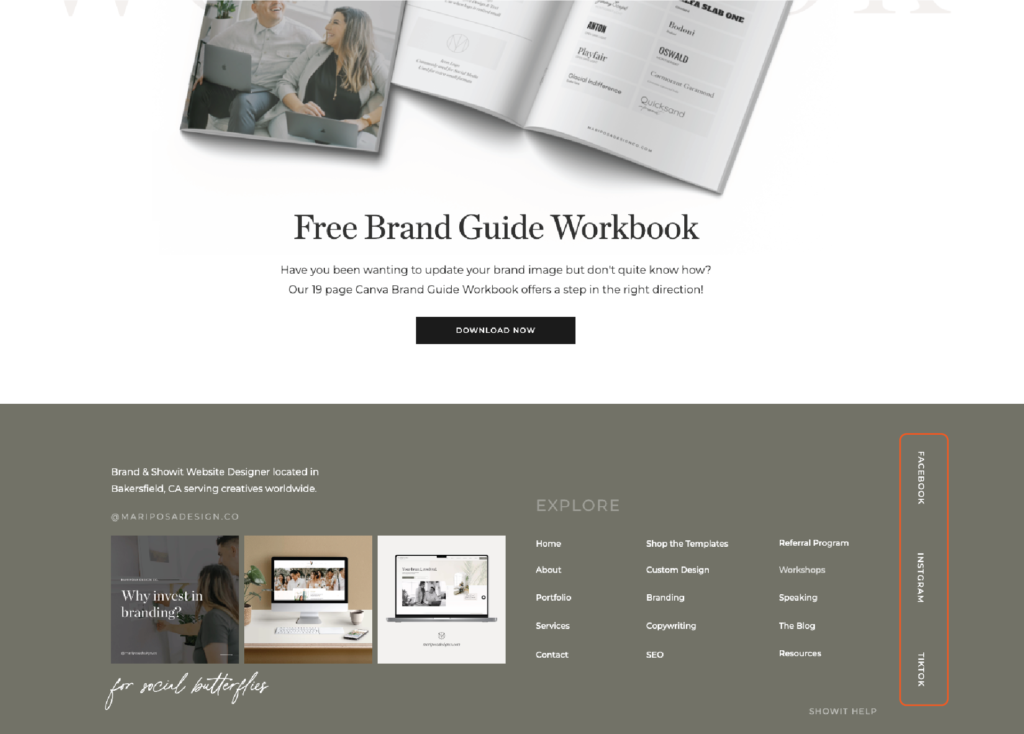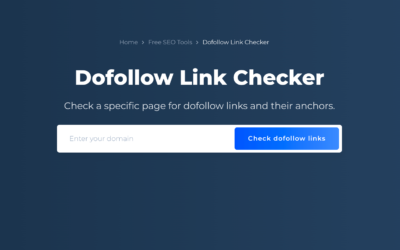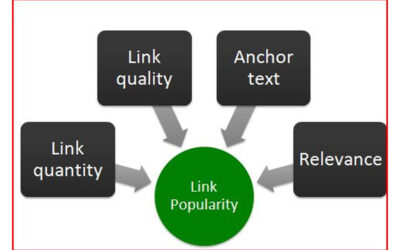Who Links to My Website? To find out who links to your website, use tools like Google Search Console and Ahrefs. These tools provide detailed backlink reports.
Understanding who links to your website is crucial for SEO and digital marketing success. Backlinks from reputable sites boost your site’s authority and search engine ranking. Tools such as Google Search Console, Ahrefs, and Moz help identify these links. They provide insights into the quality and quantity of backlinks, revealing opportunities for improvement.
Analyzing these links can uncover potential partnerships, content gaps, and areas for outreach. Regularly monitoring your backlink profile ensures you maintain a healthy and authoritative web presence. Start leveraging these tools today to enhance your website’s performance and visibility in search engine results.

Credit: showit.com
Find Sites That Link To A Site
Discovering which sites link to your website is crucial for enhancing your SEO strategy. Identify these backlinks to understand your site’s online reputation and improve your search engine ranking.
Ever wondered who links to your website? Identifying these sites can boost your SEO and online reputation. Here’s how to find those valuable backlinks.
Use Google Search Console
Google Search Console is a powerful tool for discovering backlinks.
- Set up your account: Ensure your website is verified.
- Navigate to the Links report: Find this under the “Search Traffic” section.
- Analyze your backlinks: Review which sites link to your pages.
- Use the data: Strategize your SEO based on the findings.
Employ Backlink Checker Tools
Various tools can help you uncover backlinks. These tools often provide more detailed insights.
- Ahrefs: Known for comprehensive backlink analysis.
- SEMrush: Offers a wide range of SEO tools, including backlink data.
- Moz Link Explorer: Provides insights into your link profile.
- Majestic: Specializes in backlink data and trust flow metrics.
Check Social Media Mentions
Social media platforms can also be sources of backlinks. Regular monitoring can reveal new links.
Social media monitoring tools are essential for this process:
- Brand24: Tracks mentions of your brand.
- Mention: Identifies where your site is linked.
- Hootsuite: Monitors social media activity, including backlinks.
Conduct Manual Searches
Sometimes, a manual search can uncover backlinks that automated tools miss.
Start with a Google search:
- Use “link: Yourwebsite.com”: Find pages that link to your site.
- Check referral traffic: Look in your website analytics.
- Inspect relevant forums: See if your site is mentioned.
Leverage Competitor Analysis
Understanding who links to your competitors can be insightful. This can reveal potential backlink opportunities.
Here’s how to get started:
- Use Ahrefs or SEMrush: Analyze your competitor’s backlinks.
- Identify common linking sites: Look for patterns.
- Reach out: Request backlinks from the same sources.
Collaborate With Industry Influencers
Building relationships with influencers in your industry can lead to valuable backlinks.
Consider these steps:
- Identify key influencers: Use tools like BuzzSumo.
- Engage with their content: Comment and share their posts.
- Propose collaborations: Offer guest posts or interviews.
Review Your Content For Link-worthy Assets
High-quality content naturally attracts backlinks. Ensure your content is link-worthy.
Here’s what to focus on:
- Create in-depth articles: Offer comprehensive guides or studies.
- Develop infographics: Visual content often gets more links.
- Update outdated content: Keep your information current.
Utilize Online Communities And Forums
Participating in online communities can result in backlinks. Be active and provide value.
Popular forums and communities include:
- Reddit: Engage in relevant subreddits.
- Quora: Answer questions related to your niche.
- Niche forums: Join forums specific to your industry.
Monitor Competitor Mentions
Keeping an eye on where your competitors are mentioned can uncover new backlink opportunities.
Tools to help you monitor:
- Mention: Tracks competitor mentions.
- Google Alerts: Set up alerts for competitor names.
- Ahrefs: Provides competitor mention insights.
Participate In Industry Events And Webinars
Engaging in industry events can lead to backlinks. Events often have websites that link to participants.
Steps to take:
- Attend conferences: Be active in the industry.
- Host webinars: Offer valuable insights.
- Network: Build relationships with event organizers.
Who Links To Me
Discovering who links to my website helps track backlinks, boost SEO performance, and understand referral traffic sources. Analyzing these links provides insights into site authority and audience engagement.
Ever wondered who is linking to your website? These backlinks can boost your site’s credibility and ranking. Understanding your link profile is crucial for SEO success. Let’s delve into who might be linking to your site.
Industry Blogs And Websites
Industry blogs and websites are often great sources of backlinks. These links indicate that your content is valued within your niche.
- Authoritative blogs: They often link to high-quality content.
- Industry news sites: Linking to your website for updates or expert opinions.
- Niche forums: Members may link to your site for relevant discussions.
Social Media Influencers
Social media influencers can drive traffic and links to your site. These links are essential for building brand awareness.
- Influencer mentions: They share your content with their followers.
- Social media posts: Links back to your website in their posts.
- Collaborations: Joint ventures or partnerships that include links.
Educational Institutions
Educational institutions often link to valuable resources. These links are highly authoritative and beneficial for SEO.
Many schools and universities link to your website for educational purposes. These backlinks are powerful and can significantly improve your site’s credibility.
News Outlets
News outlets frequently link to websites for sources and references. Getting featured in news articles can provide a significant SEO boost.
- Press releases: Linking back to your site when they cover your news.
- Journalist references: Citing your content as a source.
- Feature stories: Include links to your website in detailed articles.
Guest Bloggers
Guest bloggers contribute to your site and link back to their own. This mutual linking can enhance both parties’ SEO efforts.
Inviting guest bloggers can result in backlinks. They often share guest posts on their platforms, linking to your site.
Partner Websites
Partner websites link to your site as part of a mutual agreement. These links are part of strategic partnerships and collaborations.
- Business partnerships: Linking to each other’s sites.
- Affiliate programs: Affiliates link back to your products.
- Joint ventures: Collaborative projects that include backlinks.
Directories And Listings
Online directories and listings can provide valuable backlinks. These links help improve local SEO and overall visibility.
- Business directories: Listing your website.
- Local listings: Enhancing local search results.
- Industry-specific directories: Niche directories linking to your site.
Review Sites
Review sites often link to your website when they review your products or services. These links can drive targeted traffic and enhance your online reputation.
Product or service reviews on review sites can provide backlinks. Positive reviews often include links to your site.
Competitors
Competitors might link to your site as a reference. This might seem counterintuitive, but it happens in niche industries.
Sometimes, competitors link to your content for comparison or reference. This can be a backhanded compliment to your content quality.
Forums And Q&A Sites
Forums and Q&A sites like Quora can be excellent sources of backlinks. These platforms allow users to share links that provide value.
- Forum discussions: Members link to your content.
- Q&A responses: Users answer questions with links to your site.
- Community recommendations: Suggestions that include your website.
Understanding who links to your website helps improve your SEO strategy. Monitor these sources regularly and nurture relationships for continued growth.
Who Links To My Website
Discovering who links to your website helps enhance SEO strategies. Identify backlinks to improve your site’s visibility and credibility.
Knowing who links to your website is crucial for your site’s success. These backlinks help search engines understand your content’s relevance and authority. High-quality backlinks can boost your rankings and increase organic traffic. So, how can you find out who links to your website?
Let’s dive into some methods.
Using Google Search Console
Google Search Console is a free tool that provides valuable insights. It shows who links to your website and the quality of those links.
- Access the Links Report: Navigate to the “Links” section in the Google Search Console.
- Top Linking Sites: This report shows the websites that link to your site the most.
- Top Linked Pages: Discover which of your pages are linked the most.
- Anchor Text: See the anchor text used by other sites to link to your content.
Third-party Seo Tools
Numerous third-party SEO tools can help identify backlinks.
Several tools provide detailed backlink reports. These can give you a broader view than Google Search Console alone.
Competitor Analysis
Understanding who links to your competitors can be equally beneficial. This can help you identify potential backlink opportunities.
- Use SEO Tools: Tools like Ahrefs and Moz can help you see your competitors’ backlinks.
- Identify Common Links: Find sites that link to multiple competitors.
- Outreach Opportunities: Contact these sites and pitch your content.
Social Media Platforms
Social media can be a goldmine for backlinks. Monitor mentions and links shared on these platforms.
- Track Mentions: Use tools to track where your website is mentioned.
- Engage with Users: Respond to those who share your content.
- Shareability: Ensure your content is easy to share.
Content Partnerships
Building relationships with other content creators can lead to valuable backlinks. Collaborations and partnerships can be mutually beneficial.
Partnering with influencers and bloggers can increase your content’s reach. This often results in high-quality backlinks.

Credit: seomator.com
Frequently Asked Questions
How Can I Find Who Links To My Website?
You can use tools like Google Search Console, Ahrefs, or SEMrush. These tools provide detailed backlink reports. They help you identify who links to your website.
Why Are Backlinks Important For My Site?
Backlinks improve your site’s search engine ranking. They increase your website’s authority and credibility. More backlinks usually lead to higher organic traffic.
Are All Backlinks Equally Valuable?
No, not all backlinks are equally valuable. High-authority sites provide more valuable backlinks. Quality matters more than quantity in backlinks.
Can I Check Backlinks For Free?
Yes, tools like Google Search Console are free. They provide basic backlink information. Paid tools offer more detailed backlink analysis.
Conclusion
Understanding who links to your website is essential. It can boost your SEO, drive traffic, and build credibility. Utilize tools to track backlinks and analyze their impact. Maintain strong relationships with quality sites for sustained success. Keep monitoring and refining your strategy to stay ahead in the competitive digital landscape.





0 Comments